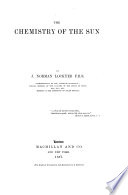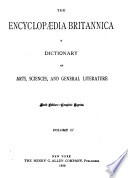 It is conceivable that the various kinds of matter, now recognized as different elementary substances, may possess one and the same ultimate or atomic molecule existing in different conditions of movement. The essential unity of matter is an hypothesis... It is conceivable that the various kinds of matter, now recognized as different elementary substances, may possess one and the same ultimate or atomic molecule existing in different conditions of movement. The essential unity of matter is an hypothesis...  Nature - Síða 2 breytti - 1880Heildartexta Nature - Síða 2 breytti - 1880Heildartexta - Um bókina
 | Sir Norman Lockyer - 1887 - 488 síður
...not know that any one of the bodies denominated elementary is absolutely indecomposable." — DALTON. "It is conceivable that the various kinds of matters,...with the equal action of gravity upon all bodies." — . GKAHAM'S Researches, p. 299. IT is because the secrets of the Sun include the cipher in which... | |
 | Sir Norman Lockyer - 1887 - 492 síður
...absolutely indecomposable." Graham also wrote, " It is conceivable that the various kinds of matter now recognised in different elementary substances may possess one and the same element or atomic molecule existing in different conditions of movability. The essential unity of matter... | |
 | 1888 - 922 síður
...since Graham's death. In it he expressed the view that the various kinds of matter now recognized as different elementary substances may possess one and the same ultimate or atomic molecule in different conditions of movement. Graham's work, viewed as a whole, is remarkable alike for its... | |
 | 1895 - 1398 síður
...similar thought when he writes : " It is conceivable that the various kinds of matter now recognized as different elementary substances may possess one and the same ultimate or atomic molecules existing in different conditions of movement. The essential unity of matter "ч an hypothesis... | |
 | James Croll - 1889 - 142 síður
...put forward by Professor Graham, who says "that it is conceivable that the various kinds of matter now recognised in different elementary substances may possess one and the same element or atomic molecule existing in different conditions of mobility. The essential unity of matter,"... | |
 | 1890 - 922 síður
...since Graham's death. In it he expressed the view that the various kinds of matter now recognized as different elementary substances may possess one and the same ultimate or atomic molecule in different conditions of movement. Graham's work, viewed as a whole, is remarkable alike for its... | |
 | Thomas Edward Thorpe - 1894 - 406 síður
...devoted the whole of a thoughtful life. He conceives that the various kinds of matter, now recognised as different elementary substances, may possess one and...molecule existing in different conditions of movement. Graham traces the harmony of this hypothesis of the essential unity of matter with the equal action... | |
 | American Association for the Advancement of Science - 1899 - 646 síður
...this as follows (loc. cit. 222). " He conceives' that the various kinds of matter, now recognized as different elementary substances, may possess one and...molecule existing in different conditions of movement. Graham traces the harmony of this hypothesis of the essential unity of matter with the equal action... | |
 | American Association for the Advancement of Science - 1899 - 650 síður
...this as follows (loc. cit. 222). " He conceives that the various kinds of matter, now recognized as different elementary substances, may possess one and...molecule existing in different conditions of movement. Graham traces the harmony of this hypothesis of the essential unity of matter with the equal action... | |
 | 1899 - 448 síður
...as follows (toc. cit., 222) : — " He conceives that the various kinds of matter, now recognised as different elementary substances, may possess one and...molecule existing in different conditions of movement. Graham traces the harmony of this hypothesis of the essential unity of matter with the equal action... | |
| |